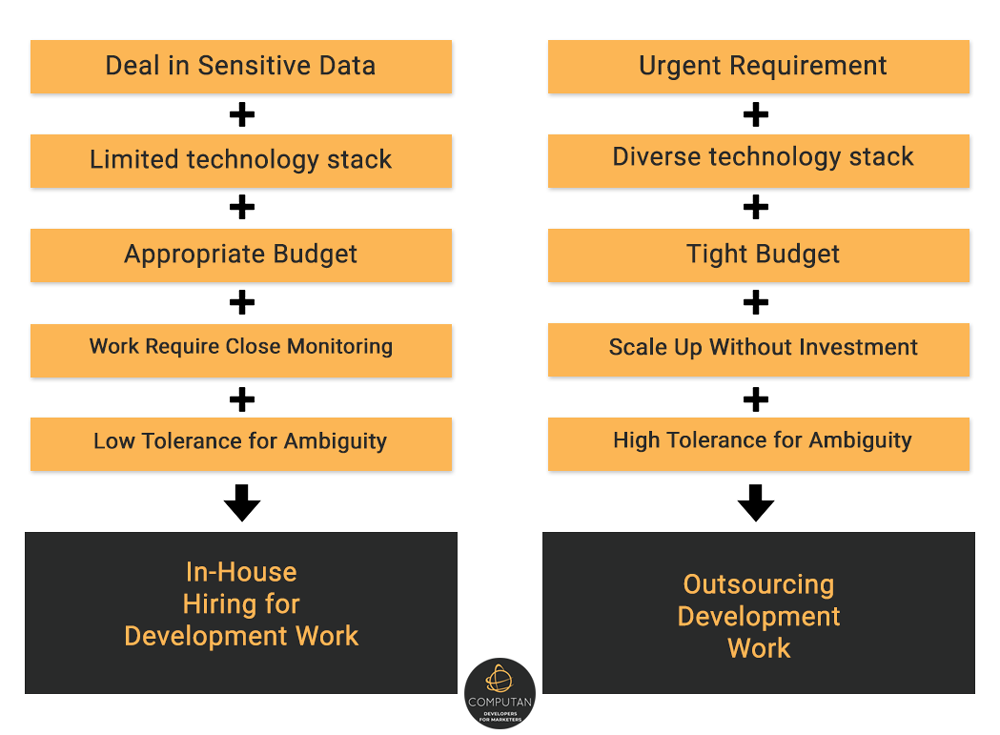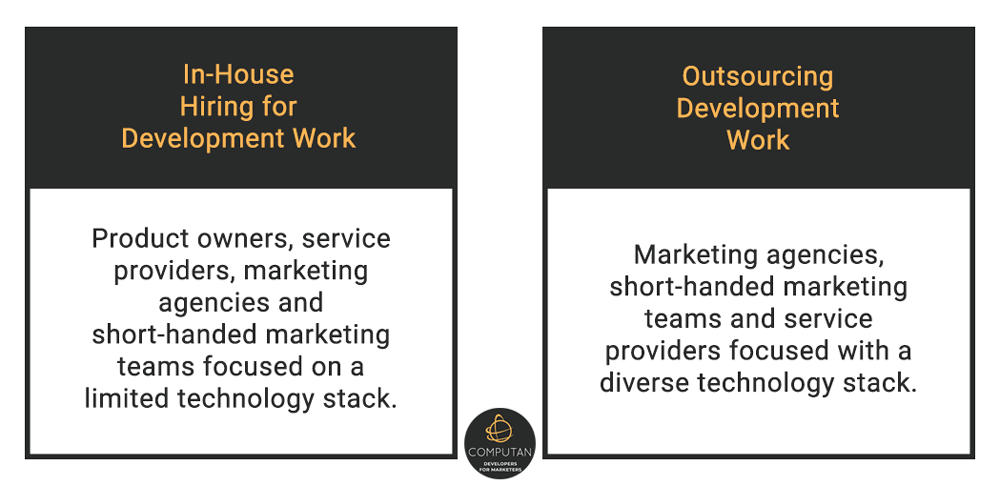Marketing Agency owners or product owners have the dilemma to build an in-house team of developers or outsource.
I’ll touch various standpoints in this blog that lead to calculated decision-making.
Outsourcing the Development Work: Why and When?
Business models that suit the outsourcing development
Marketing agencies, short-handed marketing teams, and service providers focused on a diverse technology stack.
Urgent Requirement
Hiring in-house developers on an urgent basis is a time-consuming task. You may not find the right employee in your locality to join you immediately. But the whole world is your playground when you decide to outsource. The talent you are looking for is already out there working in a dedicated development agency. See their profile, schedule a video interview, finalize the deal and you get your work done. A pace like that is hard to replicate when hunting for a developer in house and in your area. There’s a long recruiting process, and then there’s notice period the candidate must serve. The outsourcing process can go quickly if you are super lucky.
Technology Stack
If your agency works around multiple technology stacks, then the cost of managing the team to cover the entire technology stack becomes expensive. Say you have some clients on inbound marketing retainers that you run through HubSpot, another handful that you do eCommerce for using Shopify and Magento, and a few customers on WordPress.
If you have development in-house, then that’s 3 different skill sets you need. You’ll need a good HubSpot/Front-end developer to handle template building on the inbound retainer clients and a Shopify developer to help make customizations that those clients need. Magento is a huge application in and of itself that requires a PHP/MySQL developer who also knows the application structure well.
The same goes for WordPress. Sure, it’s possible one person could do general edits on each of those platforms, but not any real heavy lifting on all of them. A fork can function as a knife in some cases, like to cut butter, but you won’t be cutting vegetables with it. A wise decision would be to outsource work and manage one or two technologies in-house.
Cost
You save costs on resource assets and infrastructure in outsourcing. Plus, you don’t have to pay employees when there’s less work for them. It seems obvious, but if you don’t really have at least 140-160 billable hours of work per month of dev work to do then you don’t need a full-time developer.
Some additional costs to think about are training and retention costs. When a developer leaves, a lot of IP goes with that developer on how they coded projects, how they might have arranged for backups (since usually the developers at agencies also have to host under their wing), where the credentials are, etc. That all presents a risk to the agency, and depending on the nature of the breakup, it could be hazardous. Developers can be a rare breed sometimes, too. They might be excited to join the agency to work in a technology that you specialize in, but then after they figure out the technology and work on it repeatedly for a year or so it might become boring to them. You need to keep them excited about coming to work every day, which is annoying when you’ve got marketing to do for clients.
Time
You can outsource the work to the whole team when you hire one developer. This gets your job done easily. You don’t have to hire, train, and house multiple employees in a short time.
Scale Up Without Investment
Your scale-up options without major investment improve because, with outsourcing, you can diversify your talent pool without investing anything in infrastructure expansion. You can offer website development, mobile, and desktop app development, and game development without having to permanently hire them in-house.
Tolerance for Ambiguity
Outsourcing work has its ups and downs. If you have more tolerance for ambiguity, you’ll be comfortable in accepting the ups and downs as part of the process.’ That might mean having a few early/late calls. It also might mean spending a bit of time testing and QCing the finished product and understanding any technical issues that might come up. It can be a hassle for sure, but going through these hassles makes you a better marketing professional and a resource for your clients. Think about how good you look to others when you can help them win business and talk to their IT or help understand why a website might be down. Or, make recommendations on certain providers, website platforms, etc., based on previous experiences? Sometimes if you have a web developer in the house and you defer all those things to them, you miss out on a powerful learning opportunity.
Security
Employee policies and labor laws for in-house teams are rigid. However, in the case of company-to-company bond agreements, a lot can be modified keeping data security protocols in mind. Two companies initiate their business/work partnerships through Non-Disclosure Agreements, Legal Security Bonds, and project/work terms and conditions. These are harder to manage with an individual in-house as you can’t tweak employment laws.
Have an In-house Team of Developers: Why and When?
Business models that go well with in-house development
Product owners, service providers, marketing agencies, and short-handed marketing teams focused on a limited technology stack.
Security
If your work involves highly sensitive data that you don’t want to get into the wrong hands, in-house is your deal. You have complete control of the operations and data flow in the in-house setup. One should not risk outsourcing when dealing with compassionate data.
Tolerance of Ambiguity
If you have less tolerance for ambiguity, stick to having an in-house team to work for you. You’ll be efficient, and productive, and manage your company better this way.
Nature of the work
If your company work requires close monitoring, multiple iterations, and back-and-forth communication, prefer an in-house team. The operations will be effective in this model.
Look In The Mirror
A lot of this comes down to philosophy and beliefs as well. If you have had a bad experience with outsourcing, you’re less likely to believe it can work.
Suppose you believe that everything related to marketing needs to be done in the most collaborative way, with everyone sitting across the table from one another. In that case, even the best-outsourced providers will work. If you expect perfection on things within the first or, at max, the second go-around, you might not be the ideal fit for outsourcing. These aren’t character faults at all. This is who you are based on previous experiences, preconceived notions, thoughts, and beliefs you have developed over the years.
If you do your best marketing work at a restaurant with a developer, designer, and copywriter quickly evaluating their work and explaining what you want in a person and are willing to pay for that experience, then do that. How one marketer works can be different from another.
For example, Computan focuses on a handful of technology stacks. All the work is managed in-house effectively. We do no need to jump into a company-to-company collaboration to outsource work. Regarding development, opening branch offices from the expansion and scaling point of view are always on the cards for us.
In a Nutshell
Business Models Overview
Scenarios that lead to a calculated decision-making

If you plan to outsource, get a free quote for your project work.





